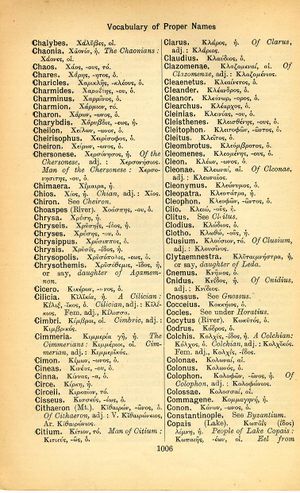Chrysa: Difference between revisions
From LSJ
πενία μόνα τὰς τέχνας ἐγείρει → poverty alone promotes skilled work, necessity is the mother of invention, necessity is the mother of all invention, poverty is the mother of invention, out of necessity comes invention, out of necessity came invention, frugality is the mother of invention
(D_2) |
(Gf-D_2) |
||
| Line 1: | Line 1: | ||
{{WoodhouseENELnames | {{WoodhouseENELnames | ||
|Text=[[File:woodhouse_1006.jpg|thumb|link= | |Text=[[File:woodhouse_1006.jpg|thumb | ||
|link={{filepath:woodhouse_1006.jpg}}]]Χρύση, ἡ. | |||
}} | }} | ||
{{Lewis | {{Lewis | ||
Revision as of 07:30, 14 August 2017
English > Greek (Woodhouse)
Χρύση, ἡ.
Latin > English (Lewis & Short)
Chrȳsa: ae, or Chrȳsē, ēs, f., = Χρύση.
I A town on the coast of Troas sacred to Apollo, Plin. 5, 30, 32, § 122; Mel. 1, 18; Ov. M. 13, 174 (cf. Hom. Il. 1, 390; 1, 452).—
II An island near Crete, Plin. 4, 12, 20, § 61.—
III An island of India, Mel. 3, 7, 7.
Latin > French (Gaffiot 2016)
Chrȳsa, æ, f., Plin. 5, 122 et Chrȳsē, ēs, f., Ov. M. 13, 174,
1 ville de Mysie
2 île près de la Crète : Plin. 4, 61
3 île de l’embouchure de l’Indus : Mela 3, 70.

